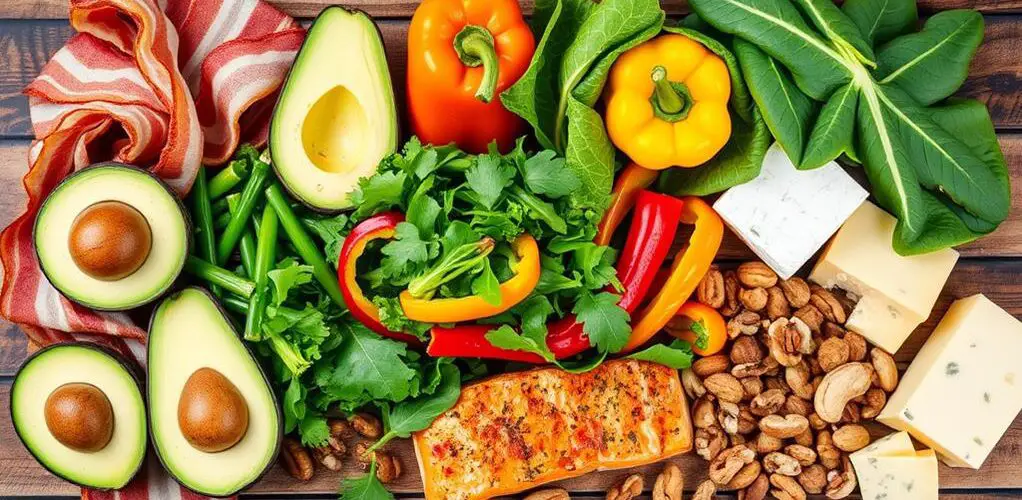
Eating keto-friendly foods means focusing on tasty low-carb options that keep you in ketosis. Think about enjoying juicy meats like chicken and steak, which are virtually carb-free and pack loads of protein. Seafood like salmon and shrimp make delicious meals while offering healthy fats. Eggs are another awesome choice, giving you protein and essential vitamins. For fats, high-fat dairy like cheese, butter, and heavy cream are winners. Don't forget your veggies—non-starchy greens like spinach and cauliflower are perfect. Even snacks like almonds and dark chocolate are on the table, if you manage portions. Want more mouth-watering keto ideas? You're in for a treat!
Key Takeaways
- Fatty fish like salmon and mackerel are carb-free, rich in omega-3s, and perfect for keto.
- Eggs are low in carbs and high in protein, supporting satiety and hormone regulation.
- High-fat dairy, including heavy cream and cheese, aids ketosis and enhances meal flavors.
- Non-starchy vegetables like spinach and cauliflower provide essential nutrients with minimal carbs.
- Nuts and seeds, such as almonds and chia seeds, offer healthy fats and fiber for keto diets.
Fish and Seafood
A commitment to a keto diet often necessitates a close examination of food choices, and fish and seafood emerge as exemplary options. With nearly zero carbs, they're a staple for anyone looking to maintain ketosis while reaping health benefits.
Fatty fish like salmon and mackerel are especially valuable, providing high levels of omega-3 fatty acids. Imagine eating a delicious 3-ounce serving of salmon loaded with 0 grams of carbs, 4 grams of fat, and 17 grams of protein. It's like hitting the jackpot of healthy eating!
Shellfish, such as shrimp and crabs, also have no carbohydrates, making them perfect for keto. But keep an eye on oysters and octopus; they have slightly variable carb counts, though still low overall.
The American Heart Association recommends eating 8-10 ounces of seafood weekly, which aligns perfectly with keto guidelines. Regular fish consumption helps improve insulin sensitivity and reduces the risk of chronic diseases.
When choosing seafood, consider sustainable sourcing to protect our oceans.
And don't forget, seafood preparation can be fun and easy. Whether grilling, baking, or sautéing, there's a way to make every meal exciting and nutritious. Happy feasting!
Meat and Poultry
Fresh meats and poultry are almost carb-free and packed with high-quality protein, making them fantastic for a keto diet.
Chicken breast, for example, offers 0 grams of carbs and a whopping 32 grams of protein per serving, while fatty cuts like ribeye steak add essential fats to your meals.
Even processed meats like bacon can be part of your diet, just be sure to pick the ones without added sugars.
Nutritional Benefits Explained
Rich in essential nutrients, meat and poultry provide significant benefits for those adhering to a keto diet. Fresh meat and poultry are virtually carb-free, boosting nutrient absorption, and offering a powerhouse of B vitamins and minerals essential for overall health.
These protein sources are important for maintaining muscle mass, especially significant when following a low-carb diet. Let's explore the specifics.
- Enhanced Muscle Preservation: High-quality proteins from chicken and turkey not only help you feel full longer but also preserve muscle mass. With about 32 grams of protein and only 3 grams of fat per 3.5 ounces, lean meats are perfect for muscle maintenance.
- Heart Health: Grass-fed beef stands out by providing higher levels of omega-3 fatty acids and conjugated linoleic acid (CLA). These nutrients may support heart health and even aid in fat loss, making your keto journey more effective.
- Boosting Good Cholesterol: Regular consumption of fatty meats can raise HDL (good) cholesterol levels, benefiting cardiovascular health. Imagine enjoying a juicy steak knowing it's good for your heart!
Integrating these keto-friendly foods into your diet can make a world of difference, ensuring you get the best of both nutrition and taste.
Best Choices Highlighted
When selecting the best meat and poultry options for a keto diet, focusing on nutrient-dense, zero-carb choices is paramount. Fresh meat and poultry are excellent because they contain no carbs and are loaded with B vitamins and essential minerals. They're fantastic protein sources, which makes them perfect for meal prep.
Fatty cuts of meat, like ribeye steak or pork belly, aren't just delicious—they help increase your HDL (good) cholesterol levels and pack in healthy fats. Imagine enjoying a juicy ribeye while knowing it's boosting your health!
Skin-on chicken thighs are another winner. With about 3 grams of fat and 27 grams of protein per 3.5-ounce serving, they're nutrient-dense and tasty.
Turkey breast is also a lean, mean protein machine. It has around 12 grams of fat and 27 grams of protein per 3.5-ounce serving, all without a single carb.
However, be cautious with processed meats like sausage and deli meats. They can have additives and lots of sodium. Stick to quality, unprocessed cuts when you can.
Eggs
Eggs are a fantastic choice for a nutrient-dense breakfast, providing less than 1 gram of carbs and around 6 grams of protein per large egg, perfect for those on a keto diet.
They're packed with essential vitamins and minerals, and their high-quality protein can help regulate hormones and keep you feeling full longer.
Plus, eggs are great for your eyes and heart, making them a delicious and healthy start to your day!
Nutrient-Dense Breakfast Option
A nutrient-dense breakfast option tailored for those adhering to a keto diet is the humble egg. Eggs are not just a simple food; they pack a punch with less than 1 gram of carbohydrates and about 6 grams of protein per large egg. This makes them an ideal start to your day.
With many egg recipes and egg preparation methods available, you can keep your mornings exciting and delicious.
Eggs are rich in essential vitamins and minerals like vitamin B12, vitamin D, and choline, which help your brain stay sharp and your metabolism running smoothly. They also contain antioxidants like lutein and zeaxanthin, which are great for eye health and can even help reduce the risk of age-related macular degeneration.
Eating eggs can also help you feel full longer, thanks to their high protein content. This can help you eat less throughout the day, a good thing if you're watching your weight. Plus, recent research shows that eating eggs daily is safe for most people, as the cholesterol in the yolks doesn't greatly increase heart disease risk.
Here are three reasons to love eggs:
- Versatile and Delicious
- Packed with Nutrients
- Keeps You Full Longer
Hormone Regulation Benefits
Incorporating eggs into your diet can greatly impact hormone regulation, enhancing overall metabolic health. Egg consumption provides high-quality protein, about 6 grams per large egg, which helps in managing hormones related to hunger and satiety. When you eat eggs, your body releases hormones like peptide YY and glucagon-like peptide-1 (GLP-1). These hormones make you feel full and help control your appetite, so you're less likely to overeat.
What's even cooler is that each large egg has less than 1 gram of carbohydrates. This makes eggs perfect for staying in ketosis while positively influencing your hormone levels.
Eggs are also packed with nutrients, including choline. Choline is super important for hormone production and regulation within your body.
Studies have shown that eating eggs can boost your HDL (good) cholesterol levels. Higher HDL levels contribute to better hormonal balance and overall metabolic health.
High-Fat Dairy
High-fat dairy products are a cornerstone of the ketogenic diet due to their low carbohydrate content and rich supply of healthy fats.
These foods not only enhance meal flavors but also help maintain ketosis and promote satiety. Let's explore how some of these high-fat dairy products can fit into your keto plan.
- Heavy Cream: Perfect for making rich, delicious cream sauces that can transform any meal. Whether it's a savory Alfredo sauce or a creamy soup, heavy cream is a versatile ingredient that keeps your dishes keto-friendly.
- Full-Fat Cheese: Options like cheddar, mozzarella, and brie are excellent choices. A one-ounce serving of cheddar cheese, for instance, contains just 1 gram of carbohydrates, 7 grams of protein, and 9 grams of fat. These cheeses can be enjoyed as snacks, melted into dishes, or even used as cheese alternatives in various recipes.
- Butter: This staple is nearly carb-free and packed with saturated fats. Spread it on keto-friendly bread, use it to fry eggs, or melt it over vegetables for an added boost of flavor and healthy fats.
Incorporating these high-fat dairy products can enhance both the taste and nutritional value of your keto meals, making your journey towards ketosis more enjoyable.
Healthy Oils
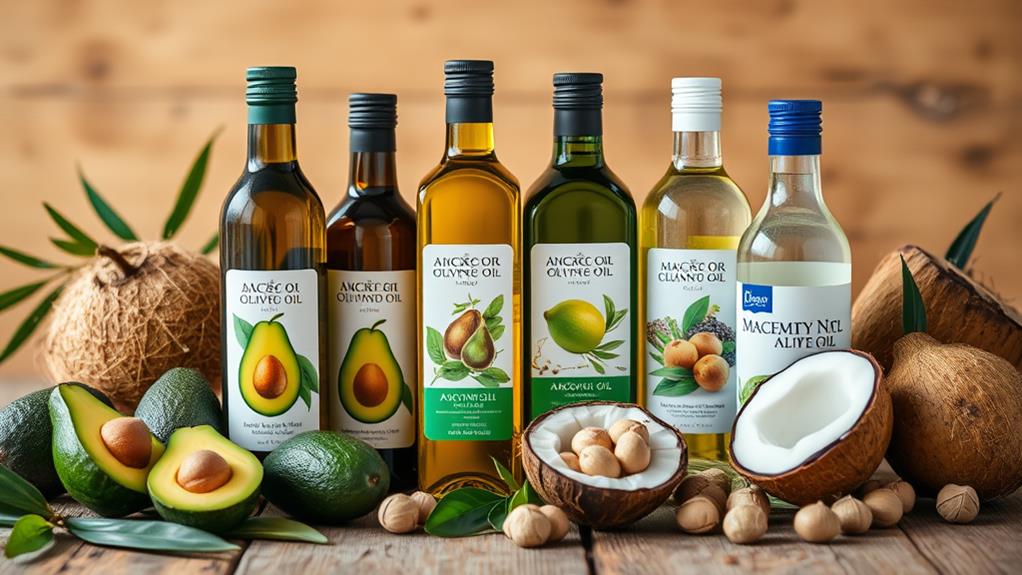
Enhance your ketogenic diet by integrating healthy oils that not only boost flavor but also offer significant health benefits. Olive oil and avocado oil, for instance, are packed with monounsaturated fats. These are great for heart health and can help reduce inflammation. Imagine drizzling some olive oil on your salad – yum and healthy!
Coconut oil is another keto superstar. It's high in saturated fats but don't let that scare you. These fats include medium-chain triglycerides (MCTs), which your body can quickly turn into energy. Some people even find that MCTs help with weight loss – that's a win-win!
Then there's ghee, a type of clarified butter that's pure and carb-free. It has a rich flavor and contains butyrate, a short-chain fatty acid that might help reduce inflammation. Plus, it makes your keto dishes taste amazing.
When it comes to oil benefits, stick to whole, unrefined sources. Avoid processed oils with unhealthy trans fats.
And remember, oil storage is key. Keep your oils in a cool, dark place to maintain their quality. Healthy oils can be your best friends on a keto journey.
Non-Starchy Vegetables
While healthy oils play a significant role in a ketogenic diet, non-starchy vegetables are equally important. These nutrient-packed vegetables provide essential vitamins and minerals while keeping your carb count low, making them a staple in keto meal preparation.
Different vegetable varieties, like leafy greens and cruciferous vegetables, not only add flavor but also keep meals exciting.
Consider the following benefits of non-starchy vegetables on a keto diet:
- Nutrient Density: Spinach, kale, and Swiss chard are loaded with vitamins A and K. Just one cup of spinach has only 1 gram of net carbs!
- Versatility: Cauliflower and zucchini can be transformed into low-carb alternatives to rice, mashed potatoes, and even pasta. Imagine enjoying a creamy cauliflower mash with your favorite keto-friendly main dish.
- Color and Flavor: Bell peppers, especially green ones, brighten up any dish. They're rich in vitamin C and have just about 3 grams of carbs per medium pepper.
Including these non-starchy vegetable varieties in your meal preparation not only supports your keto goals but also brings color, flavor, and essential nutrients to your diet.
Eating keto-friendly doesn't have to be boring; with these options, your meals can be exciting and nutritious.
Avocados
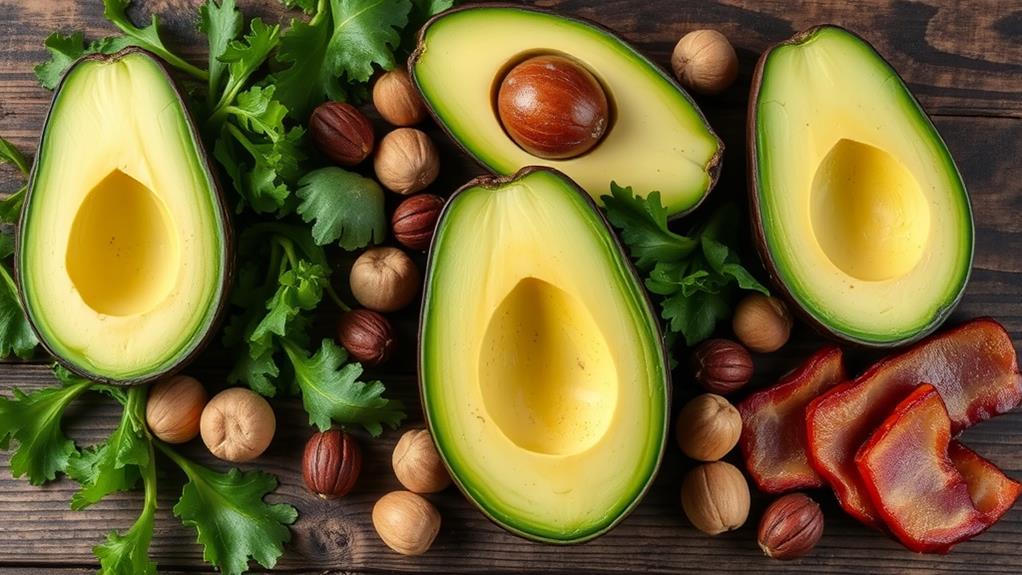
Renowned for their rich, creamy texture, avocados are a quintessential component of the ketogenic diet. With only 1.5 grams of net carbs per fruit, avocados are a low-carb dream. They are packed with monounsaturated fats that promote heart health and can help lower bad cholesterol while increasing good cholesterol.
Plus, they are a great source of potassium, providing around 975 mg per medium fruit—essential for regulating blood pressure and maintaining electrolyte balance.
But that's not all. Avocados are brimming with essential nutrients, including vitamins E, K, B6, and C, and high in antioxidants, which support overall health.
Whether you prefer the classic Hass or the larger, smoother Florida avocado varieties, there's an option to suit every taste.
The versatility of avocados makes them a star in the kitchen. You can blend them into smoothies, slice them for salads, or mash them into a creamy spread.
Avocado recipes like guacamole, avocado toast (using keto bread, of course), and even avocado chocolate mousse keep your meals exciting and low in carbs.
Nuts and Seeds
A cornerstone of the ketogenic diet, nuts and seeds offer a blend of healthy fats, fiber, and essential nutrients that are perfectly aligned with keto principles. They are ideal as snack options and come in various nut varieties, each bringing unique benefits to your diet.
Almonds are a popular choice, providing about 14 grams of fat and only 2.6 grams of net carbs per ounce. They make for a crunchy, satisfying snack that keeps you full longer.
Chia seeds, another fantastic option, offer 9 grams of fat and just 2 grams of net carbs per ounce. Their high fiber content helps with satiety, making them a great addition to smoothies or keto puddings.
Walnuts are another excellent choice, containing 18 grams of fat and only 4 grams of net carbs per ounce. They are also rich in omega-3 fatty acids, essential for heart health.
Pumpkin seeds, or pepitas, are low in carbs with 5 grams of net carbs per ounce and provide a good source of protein with 7 grams per serving.
Here are three reasons to love nuts and seeds on keto:
- High in healthy fats
- Low in net carbs
- Rich in fiber and nutrients
Berries
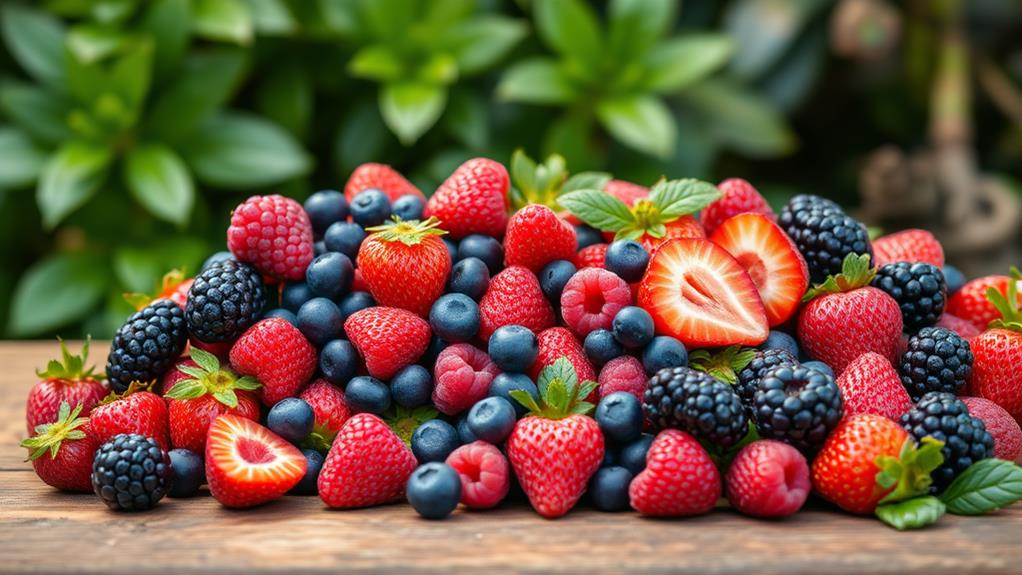
When it comes to keto-friendly foods, berries like strawberries and raspberries stand out because they're lower in carbs compared to most fruits, with about 11 to 14 grams per cup.
Besides being delicious, these berries are packed with antioxidants, vitamins, and minerals that can help you stay healthy and potentially ward off chronic diseases.
You can enjoy them in moderation to satisfy your sweet tooth without breaking your carb bank, especially in tasty recipes like smoothies or yogurt.
Low-Carb Berry Options
Berries like strawberries, blackberries, and raspberries offer a delightful and nutritious option for those adhering to a keto diet. These berries are not only delicious but also low in carbohydrates, making them perfect for satisfying sweet cravings without derailing one's keto journey.
The berry benefits are substantial; they are packed with fiber, which aids in digestion and helps keep you feeling full longer.
It's essential to practice portion control when incorporating these berries into your meals. Here's why:
- Strawberries: With around 11 grams of carbs per cup, they're a sweet treat that won't break your carb bank.
- Blackberries: At approximately 13 grams of carbs per cup, they offer a tart flavor that pairs well with yogurt or salads.
- Raspberries: Containing about 14 grams of carbs per cup, they add a burst of color and taste to smoothies or keto desserts.
Moderation is key. By keeping an eye on your portions, you can enjoy these berries without exceeding the keto diet's daily carbohydrate limits of 20-50 grams.
Whether added to yogurt, blended into smoothies, or sprinkled over salads, these berries can enhance your keto meals delightfully!
Antioxidant and Nutrient Benefits
While low-carb berries are a delightful addition to a keto diet, their benefits extend far beyond just their carbohydrate content. These juicy fruits, like strawberries and raspberries, are packed with antioxidants that help fight oxidative stress and inflammation. This makes them not just tasty, but also great for reducing the risk of chronic diseases.
Berries have a nutrient synergy that makes them a powerful health booster. They are rich in vitamins and minerals such as vitamin C, manganese, and dietary fiber. This combination supports overall health and aids digestion. The high antioxidant content, particularly anthocyanins, found in berries like blackberries and strawberries, promotes heart health and sharpens cognitive function.
Here's a quick look at the nutritional benefits of these berries:
| Berry Type | Carbs per Cup | Key Nutrients |
|---|---|---|
| Strawberries | 11 grams | Vitamin C, Manganese |
| Blackberries | 13 grams | Fiber, Anthocyanins |
| Raspberries | 15 grams | Vitamin C, Fiber |
Antioxidant absorption from berries helps your body fight off harmful free radicals, making them a smart choice for a keto-friendly diet. So, enjoy these little bursts of sweetness without the guilt!
Shirataki Noodles
Renowned for their low-calorie and low-carb profile, Shirataki noodles serve as an exceptional alternative to traditional pasta, making them a staple in ketogenic diets. These noodles contain less than 1 gram of net carbs per serving, primarily composed of water and glucomannan fiber, making them virtually calorie-free.
Shirataki noodles can absorb flavors well, making them versatile for various recipes, including stir-fries, soups, and salads.
Here are some key benefits to get excited about:
- Weight Loss Support: The glucomannan fiber in Shirataki noodles may promote feelings of fullness, aiding in appetite control and potentially supporting weight loss efforts.
- Versatility: Available in various shapes like spaghetti, fettuccine, and rice, they cater to different culinary preferences.
- Accessibility: Widely available in grocery stores, making it easy to incorporate them into your diet.
For those diving into shirataki recipes, here are some cooking tips: Rinse the noodles thoroughly to remove any initial odor, then dry-roast them in a non-stick pan for a few minutes to improve their texture.
Feel free to mix them with your favorite low-carb sauces and veggies for a delicious keto-friendly meal.
Dark Chocolate

Dark chocolate can be a delicious and keto-friendly treat, especially if you choose varieties with 70% cocoa or higher.
These high-cocoa options are not only lower in sugar but also packed with antioxidants that can boost heart health.
Just remember to keep an eye on portion sizes, as this tasty indulgence is quite calorie-dense and can add up quickly.
Antioxidant Health Benefits
A significant number of keto-friendly foods offer not only low carbohydrate content but also notable health benefits, and dark chocolate is no exception.
Dark chocolate, especially those with 70% cocoa or higher, is packed with antioxidants known as flavanols. These flavanols are great because they can help lower blood pressure and improve heart health. Plus, they combat oxidative stress, which is when your body has too many harmful free radicals. This means less inflammation and a lower risk of chronic diseases.
Here are three reasons why dark chocolate shines as a keto-friendly treat:
- Heart Health: The flavanol benefits help your heart stay strong by improving blood flow and lowering blood pressure.
- Brain Boost: By enhancing nitric oxide levels, dark chocolate can actually help your brain function better, making you quicker on your feet.
- Sweet Satisfaction: Dark chocolate can satisfy those pesky sweet cravings without wrecking your keto diet, thanks to its lower carb content.
Choosing High-Cocoa Varieties
When integrating dark chocolate into a keto diet, selecting varieties with high cocoa content is paramount. Dark chocolate benefits include lower sugar levels and higher fat content, especially in varieties with at least 70% cocoa. This makes it a fitting choice for satisfying sweet cravings while sticking to a low-carb regimen.
A 100g serving of high-cocoa dark chocolate contains about 43g of carbohydrates, 7g of fiber, and 47g of fat. This nutritional profile makes it a keto-friendly treat rich in antioxidants and flavanols, which can help lower blood pressure and boost heart health. But remember, not all dark chocolates are created equal. Always check the ingredient list to avoid added sugars and unhealthy fats.
| Cocoa Content | Carbohydrates (per 100g) | Fat (per 100g) |
|---|---|---|
| 70% | 43g | 47g |
| 85% | 30g | 50g |
| 90% | 20g | 52g |
Additionally, cocoa powder alternatives can be a great way to incorporate chocolate flavor into keto recipes. Unsweetened cocoa powder provides minimal carbs while still delivering those dark chocolate benefits. Next time you're baking, consider swapping in cocoa powder for a guilt-free chocolate experience!
Moderation and Portion Control
Balancing indulgence with restraint is key when incorporating dark chocolate into a keto diet. Dark chocolate, especially those with 70% cocoa or higher, can be a delightful treat, but portion control is imperative. With 43g of carbohydrates per 100g, including 7g of fiber, the net carbs come to about 36g. A standard serving size is 1 oz (28g), which contains roughly 12g of carbohydrates and 2g of fiber, making it 10g of net carbs per serving.
To enjoy dark chocolate responsibly on a keto diet:
- Stick to small portions: Limit your intake to 1 oz to avoid exceeding your daily carb limit.
- Choose wisely: Opt for high-cocoa varieties without added sugars to keep carb content low.
- Mind the calories: Dark chocolate is calorie-dense, so even a small amount can add up quickly.
Consuming dark chocolate in moderation not only satisfies your sweet tooth but also provides antioxidants and flavanols that may lower blood pressure and improve heart health.
Always check the labels to verify you're not unintentionally consuming extra sugars or carbs. By practicing portion control, you can enjoy this keto-friendly delight without compromising your dietary goals.
Unsweetened Beverages
For individuals adhering to a keto diet, unsweetened beverages are indispensable allies in maintaining low carbohydrate intake.
When it comes to hydration strategies, nothing beats the simplicity of water. It's essential to stay hydrated, and water is the ultimate zero-carb drink. But let's be real, plain water can get boring. So, what are some beverage alternatives?
Black coffee is a fantastic choice. Not only does it have zero carbs, but the caffeine can also give your metabolism a little boost. Plus, it might just be the morning pick-me-up you need to tackle your day.
Unsweetened tea, whether green or herbal, is another excellent option. These teas are packed with antioxidants, which can help your body fight off those pesky free radicals.
And if you like your drinks a bit sweeter, consider using stevia. This natural sweetener has about 1 gram of carbs per packet, so it won't throw you off your keto game.
But watch out for flavored sparkling waters! Some of them sneak in added sugars or carbs, which can mess with your ketosis. Always check the labels to make sure you're staying within your carb limits.
Plant-Based Milk
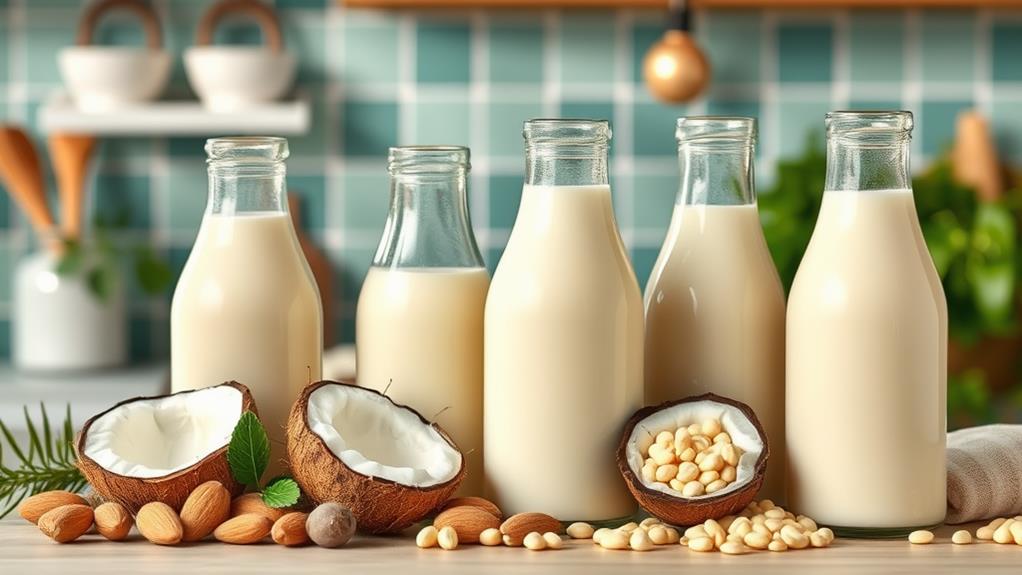
Plant-based milks, such as almond, soy, and coconut milk, offer keto dieters a low-carb alternative to traditional dairy products.
These milk substitutes are perfect for avoiding excess sugar intake while maintaining a creamy texture and rich flavor.
Almond milk is a standout among plant-based alternatives, containing just 1 gram of net carbs per cup.
It's an excellent choice for those looking to keep their carb intake to a minimum.
Soy milk, another keto-friendly option, has about 3-4 grams of carbs per cup and is also a robust source of protein, which is great for muscle maintenance.
Coconut milk, particularly in its canned form, is a versatile and delicious option, with around 6 grams of carbs per cup.
It is high in healthy fats, making it ideal for cooking and baking keto recipes.
To evoke emotion, consider these benefits:
- Stay on track with your keto goals without sacrificing taste.
- Enjoy versatility in your diet with various milk substitutes.
- Feel great knowing you're choosing healthy, low-carb options.
Remember to opt for unsweetened versions to avoid hidden sugars that can disrupt your keto progress.
Monitoring Nutrient Intake
Ensuring adequate nutrient intake is paramount when adhering to a ketogenic diet. Tracking your nutrients can feel like a full-time job, but it's super important to keep everything in balance.
One thing you can't forget is fiber. Fiber sources like non-starchy vegetables, nuts, and seeds are your best friends. Without enough fiber, things can get, well, a bit backed up, if you know what I mean.
Balancing your diet with high-fat dairy and healthy fats like olive and avocado oils is also key. But don't forget to mix in those plant foods to dodge any nutrient gaps.
Speaking of gaps, B vitamins, especially B12 and folate, can be tricky to get enough of since you're skipping grains and certain fruits and veggies.
And let's talk electrolytes—sodium, potassium, and magnesium. Missing out on these can make you feel like you've got the "keto flu." Trust me, you don't want that.
To keep track of all this, nutritional apps or food diaries can be lifesavers. They help you stay within your carb limits while making sure you're getting all the vitamins and minerals you need.
Happy keto-ing!
Frequently Asked Questions
What Foods Can I Eat on a Keto Diet?
When considering keto meal prep, opt for meats like chicken, pork, and beef, fatty seafood such as salmon, eggs, low-carb vegetables including spinach and broccoli, and dairy products like hard cheeses. Effective keto grocery shopping guarantees these essentials.
What Food Is Not Allowed in Keto?
High carb foods such as bananas, apples, bread, rice, pasta, potatoes, and sugary items are not allowed on a keto diet. These keto food restrictions are essential to maintaining ketosis and achieving desired health benefits.
What Are the 9 Rules of Keto?
The nine rules of keto include high fat intake, low carbohydrate consumption, moderate protein, focus on whole foods, hydration, electrolyte monitoring, meal planning, portion control, and mindful dining. These principles are essential for effective keto meal prep and dining.
What Are Some Keto Snack Foods?
Some keto snack foods include almonds, walnuts, chia seeds, hard and soft cheeses, olives, and sugar-free beef jerky. Nut butter options and low carb dips paired with homemade vegetable chips also make excellent keto-friendly snacks.
Conclusion
Adopting a keto diet involves making thoughtful food choices. Including fish, seafood, meat, poultry, eggs, high-fat dairy, and healthy oils guarantees essential nutrients while maintaining ketosis. Dark chocolate and unsweetened beverages provide enjoyable options, and plant-based milk offers lactose-free alternatives. Monitoring nutrient intake is vital to avoid deficiencies. By understanding keto-friendly foods, individuals can successfully navigate this diet, balancing enjoyment and nutrition for peak health outcomes.

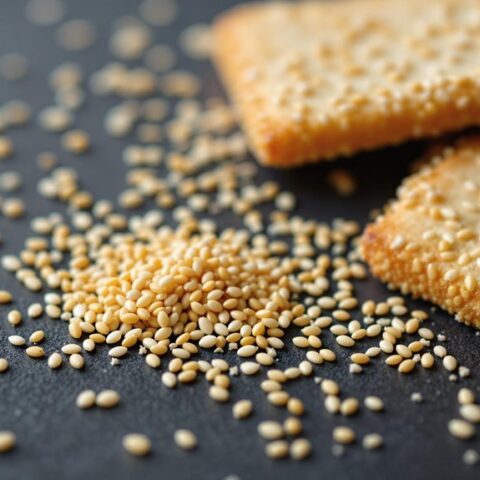



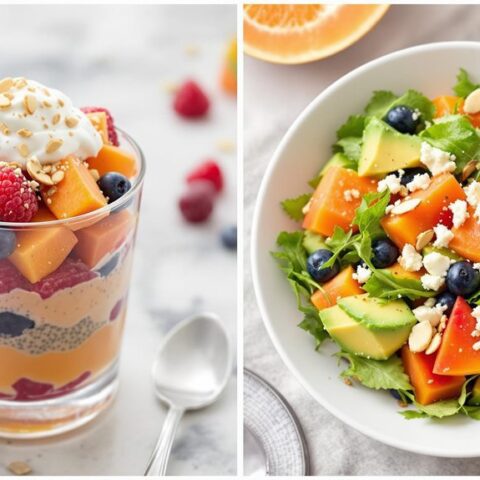




No Comments